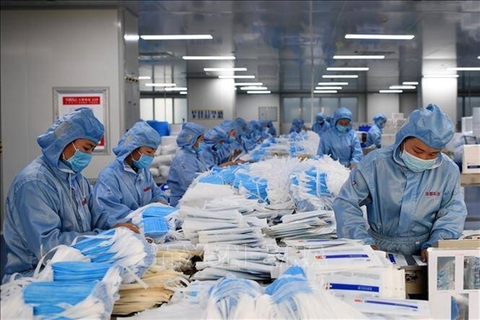especially the US, which tended to increase trade defence measures.
 |
|
The US is one of the leading economic and trade partners and the largest export market of Viet Nam. |
Experts from the Trade and Investment Promotion Center of HCM City (ITPC) mentioned the matter at a seminar on legal issues when exporting to the US market in the city on January 21.
Tran Phu Lu, deputy director of ITPC said: “Viet Nam has participated in many Free Trade Agreements (FTAs), creating conditions for export goods to enjoy preferential tariffs, improving the competitiveness capacity and export turnover. However, a number of investigations and trade protection measures for local products also increased.”
According to statistics of the Ministry of Industry and Trade (MoIT), by the end of 2020, it recorded and handled 193 cases of foreign trade defence on Vietnamese goods, including 108 anti-dumping cases, 22 countervailing cases, 23 tax evasion cases and 40 self-defence cases. So far, Vietnamese export goods have been investigated for trade defence with the affected turnover of up to US$12 billion.
There were 32 initiations of investigations recorded last year, doubling the figure in 2019. The majority of goods subject to trade defence investigations included metals, fibers, and aquatic products, plywood, building materials and chemicals, which were known as the country’s advantages.
The markets that regularly investigate trade remedies for Viet Nam's exports included the US, India, EU, Turkey, Canada and Australia, which accounted for 62 per cent of the trade remedies cases on Vietnamese exports, said MoIT.
It added ASEAN countries were also actively investigating trade remedies with 38 cases, or 20 per cent of the total cases.
Director Lu said: “The US is one of the leading economic and trade partners and the largest export market of Viet Nam. However, with a complicated and regulated legal system, it always has many potential risks for Vietnamese exporters. Every year, the number of imported consignments from Viet Nam which are sued and ordered to be destroyed or returned from the market is increasing.”
“In addition, many key export commodities of Viet Nam easily fall into the sights of investigating trade defence suits, creating difficulties and challenges for Vietnamese businesses, as a result, they are required to pay attention to information when they want to boost their exports to the US market,” said Lu.
C. Matthew, Attorney at Dentons International Law Firm, told the seminar: “The US is a large consumer market and a trading partner that many countries want to penetrate. However, this is also a market with lots of potential legal risks, especially the increase of trade remedies in recent times. The US will adjust different trade policies to protect the interests of the nation in different phases with different partners.”
Matthew said the US tended to increase supervision with commodities and countries with large trade surpluses, which increase abnormally and rapidly in a short period of time and pay special attention to the issue of the true origin of goods.
Matthew said due to favourable conditions such as the attraction of foreign investment leading to increased export production, taking advantage of supply chain disruptions and gaps in the US market, Viet Nam has more chance to enter the market. However, he added the excessive increase in turnover of some products would make them face the risk of lawsuits and trade remedies. If tax is imposed on a product, it could affect the whole industry and make many others leave the market because the US trade defence tax rate was often very high.
Diep Quoc Ke, CEO of ASIA Golden Link INC, recommended: "Prevention is better than cure," suggesting exporters identify risks to avoid investigations or cases on trade remedies, especially for the US market.
Ke said the businesses must understand the US legal system and the federal law as there were separate laws for each state, adding it was important to understand trading partners to avoid high-risk transactions.
Experts also emphasised enterprises importing raw materials or semi-finished products from a third country to process then export to the US needed to pay special attention to the history of the trade of such goods between the United States and the third country and not use raw materials and products that the US was applying trade remedies for export or all products of Viet Nam will be subject to the same commercial defence measures.
Instead, Vietnamese businesses should learn and boost the import of raw materials and goods from the US to serve local production and consumption. — VNS

US not impose tariff or sanction on Vietnam’s exports
The US Trade Representative (USTR), in its report released on January 15 on findings in the Section 301 investigation of Vietnam’s acts, policies, and practices related to currency valuation,